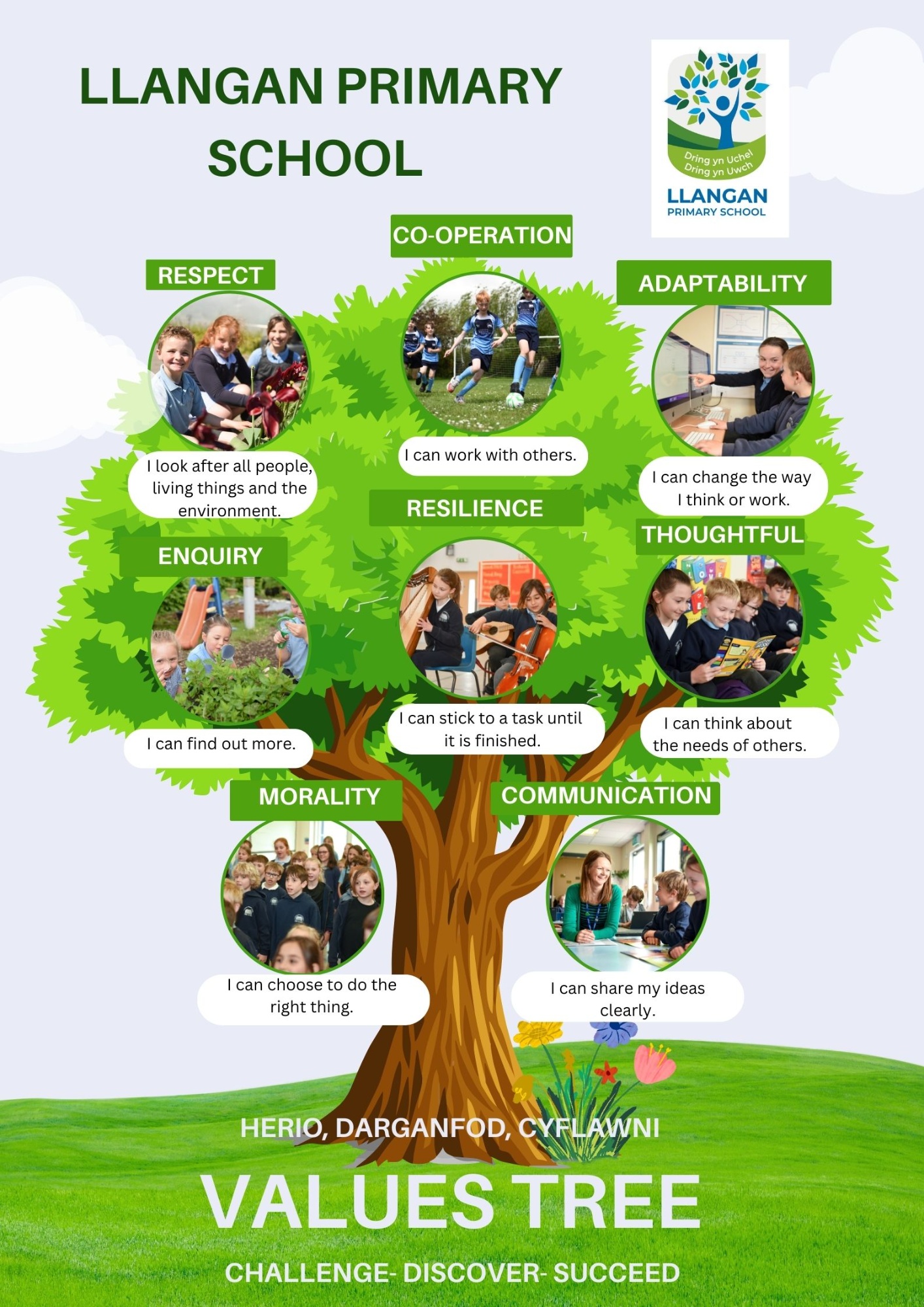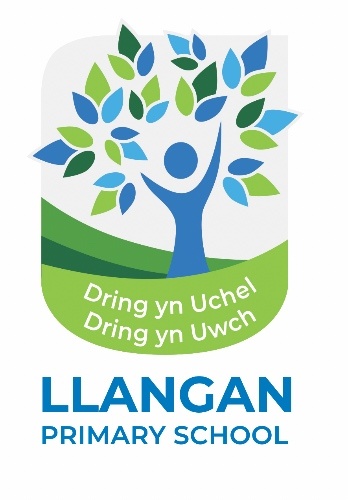Vision, Values & Motto
Our Vision - Ein Gweledigaeth

Our School Values- Gwerthoedd Ein Hysgol

Our Motto - Ein Arwyddair
Dring Yn Uchel- Dring Yn Uwch
(Climb High - Climb Higher)
Llangan Strategic Aims- Challenge- Discover- Succeed
Strategic Aims are a set of actions, outlining our plans for the school, for the next few years. They don't replace our motto of "Dring yn Uchel, Dring yn Uwch" but complement it.
CHALLENGE
We challenge our children to do their very best and to apply a positive, goal-oriented attitude in the process. We encourage them to support each other and to set a good example within our caring Llangan community. We support them to challenge each other with kindness, understanding and positivity. Our curriculum is unique to our school and we aim to be inspiring, creative and engaging for everyone.
DISCOVER
We value and celebrate diversity and individuality. We enable our children to discover their unique interests and abilities. We recognise that the best way of learning is often a journey and that a positive attitude leads to a more successful and satisfying outcome. We learn that it is important to contribute to the world and not just take from it.
SUCCEED
We prepare our children for the future by encouraging growing independence and by celebrating success in many different forms. We support children and families in every way we can and we ensure that all our children are safe, happy and confident so that they can achieve the best possible outcomes.
Llangan School's Values
Llangan's ethos focusses on 8 personal values that we believe are necessary for children of the 21st century. These values are abilities and characteristics that children will need to equip them for an ever-changing world. These values are: adaptability, communication, cooperation, enquiry, morality, resilience, respect and thoughtfulness. Let's have a look at how you can help your child grow in each of these personal goals.
Adaptability
-
Asking them to do a familiar routine in a different way.
-
Change the rules to an activity/task while they are doing it.
-
Take a different route to a familiar place.
-
Make small changes to your child/ward’s daily routine.
-
Discuss how a character deals with change in a story/movie. Ask your child/ward how they would deal with the situation.
Communication
-
Asking your child/ward to say the same sentence with different tones (soft, loud) and expressions (happy, angry).
-
Playing games like ‘Charades’, ‘Telephone’, ‘Pictionary’, and ‘Backdraw’.
-
Listening actively to your child/ward when they speak to you.
-
Inviting your child/ward to repeat what you have said in their own words
-
Allowing your child to speak fully before you answer them.
-
Encouraging your child to learn another language.
Cooperation
-
Creating a time table for your household chores.
-
Encouraging your child to participate in team games or sports.
-
Setting them challenges that require them to work with other people.
-
Focusing on being fair and taking turns when playing games at home.
Enquiry
-
Allowing your child to observe everyday routines. Encourage them to make notes on the order the activities take place.
-
Creating ' a question of the day' box. Allow your child to find the answer to the question.
-
Playing "Which do you prefer?" Ask you child to state the reasons for these answers.
-
Playing 'Odd one out. Each person is given a number of objects and they must explain which one is odd and why.
-
Encouraging your child to research sometimes that interests them.
-
Asking your child to make a mindmap on a topic.
-
Allowing your child to predict how a story will end.
Morality
-
Giving your child age appropriate household chores.
-
Encouraging your child to donate items or raise money for charity.
-
Reading fables or watching movies with a moral in them. Ask your child/ward to explain what the moral of the fable/movie is.
-
Getting your child to act out different scenarios. Get them to act out the right way to deal with the problem, and the wrong way to deal with the problem.
-
Sharing an article in the news about moral issues. Ask your child to share what they think is right and wrong with the issue.
-
Asking your child to create a piece of art that expresses their moral values.
Resilience
-
Praising your child for accomplishing a task.
-
Providing some advice/prompts if your child is having difficulty with a task.
-
Persuading your child to help with tasks at home.
-
Encouraging your child to develop their own daily routine.
-
Advising your child to take a break if they are having problems.
-
Helping your child to set goals for their lives. Get them to think of the steps they need to take and celeb rate when they achieve them.
-
Asking your child to share what they have learnt following a tough situation. Share your own experiences to help them learn how to discuss this with you.
-
Encouraging your child to think about their strengths when they are finding something hard.
Respect
-
Creating family rules for particular behaviours.
-
Encouraging your child/ward to say “Please” and “Thank You”.
-
Setting clear instructions on how you would like your child to act in a situation, and the rewards and consequences of their actions.
-
Asking your child to write ‘Thank You notes’.
-
Informing your child of any compliments you have heard from other people.
-
Sticking to your promises. Encourage your child to mean what they say.
Thoughtfulness
-
Encouraging your child to think about doing, or saying something before they carry it out.
-
Practicing sharing your ideas or belongings with your child/ward.
-
Encourage them to do the same with their things.
-
Donating toys, books, or money to charity.
-
Volunteering for local community service acts.
-
Reading a book to your child in which a character gets angry or upset. Ask your child “How would you feel if you were in this situation?” and “How would you like someone to help you?”
-
Establishing a ‘Good Deed for theDay’. Encourage your child to do one good deed for someone else. Discuss with your child/ward how they felt afterwards.
